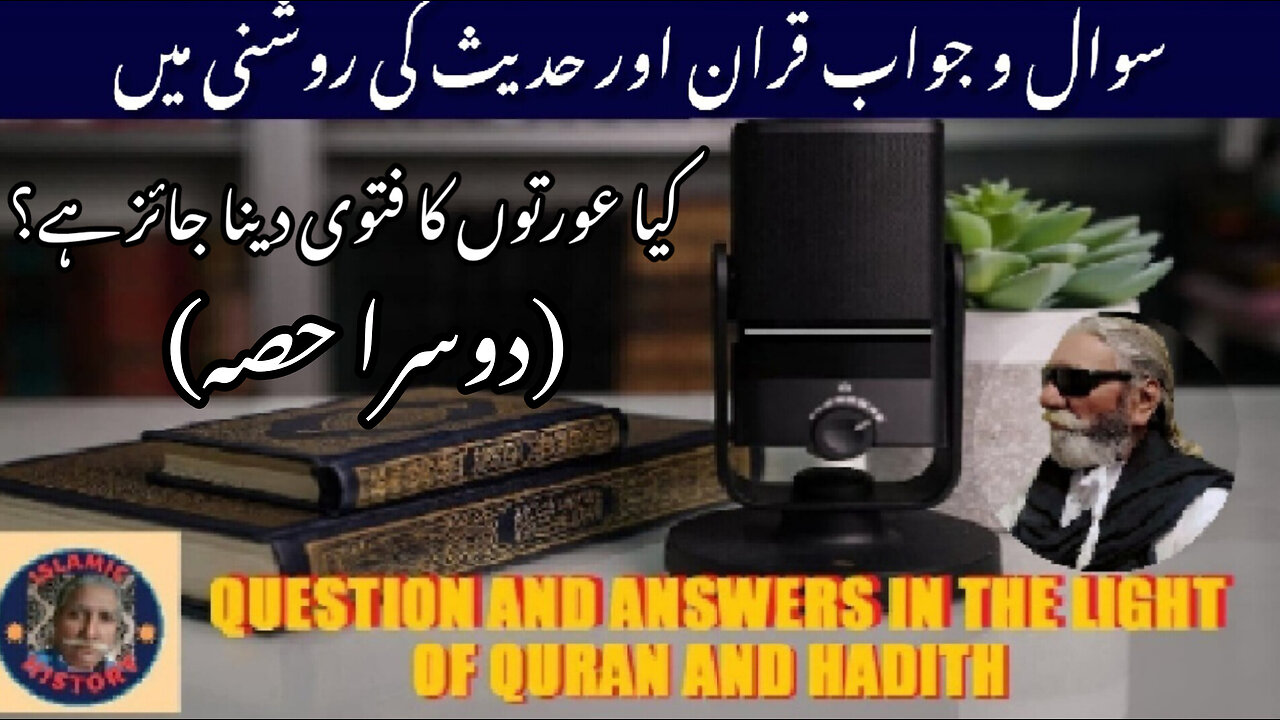Premium Only Content

Part-2 | Is it valid for women to issue fatwa?
@islamichistory813 #FatwaDebate #WomenScholars #IslamicLaw
Part-2 Is it valid for women to issue fatwas?
Which are the women whom Imam adh-Dhahabi described as having knowledge and understanding of religion.
Asslamoalaikum sisters brothers friends and elders As yesterdsay we said in first part so We will be list here today some of the women whom Imam adh-Dhahabi (may Allah have mercy on him) described as having knowledge and understanding of religion in his book.
1.. Safiyyah bint Shaybah.
Adh-Dhahabi (may Allah have mercy on him) said:
Safiyyah bint Shaybah ibn ‘Uthmaan ibn Abi Talhah, the faqeehah and ‘aalimah (scholar).
Siyar A‘laam an-Nubala’ (3/507, 508).
2.. Umm ad-Darda’.
Adh-Dhahabi (may Allah have mercy on him) said:
Umm ad-Darda’, the lady, the ‘aalimah, the faqeehah. She is Umm ad-Darda’ as-Sughra (the Younger).
She narrated a great deal of knowledge from her husband Abu’d-Darda’, and from Salmaan al-Faarisi, Ka‘b ibn ‘Aasim al-Ash‘ari, ‘Aa’ishah, Abu Hurayrah and a number of others.
She recited the entire Qur’an to Abu’d-Darda’ when she was very young.
She lived a long life, and was famous for her knowledge, good deeds and asceticism (zuhd).
Mak-hool said: Umm ad-Darda’ was a faqeehah.
Siyar A‘laam an-Nubala’ (4/277, 278).
3.. Mu‘aadhah al-‘Adawiyyah (d. 83 AH).
Adh-Dhahabi (may Allah have mercy on him) said:
Mu‘aadhah bint ‘Abdillah. The lady, ‘aalimah, mother of as-Sahba’ al-‘Adawiyyah al-Basriyyah, devoted worshipper, wife of the leading example Silah ibn Ashyam.
She narrated from ‘Ali ibn Abi Taalib, ‘Aa’ishah and Hishaam ibn ‘Aamir.
Siyar A‘laam an-Nubala’ (4/508, 509).
4.. Bint al-Mihaamili (d. 377 AH).
Adh-Dhahabi (may Allah have mercy on him) said:
The scholar, faqeehah, mufti, Amat al-Waahid bint al-Husayn ibn Ismaa‘eel.
She was taught by her father and narrated from him, and also from Ismaa‘eel al-Warraaq and ‘Abd al-Ghaafir al-Homsi. She memorized the Qur’an and the fiqh of ash-Shaafa‘i. She was well versed in shares of inheritance, Arabic language, and other subjects.
Al-Burqaani said: She used to issue fatwas with Abu ‘Ali ibn Abi Hurayrah.
Someone else said: She was one of the most well versed of people in fiqh.
Siyar A‘laam an-Nubala’ (15/264).
5.. Kareemah bint Ahmad ibn Muhammad ibn Haatim Umm al-Kiraam al-Marzawiyyah (d. 463 AH).
Adh-Dhahabi (may Allah have mercy on him) said:
The shaykhah, ‘aalimah, woman of virtue, narrator of hadith, Umm al-Kiraam.
Siyar A‘laam an-Nubala’ (18/233, 234).
6.. ‘Aa’ishah bint Hasan bin Ibraaheem (d. 460 AH).
Adh-Dhahabi (may Allah have mercy on him) said:
The preacher, ‘aalimah, narrator of hadith, Umm al-Fath al-Asbahaaniyyah al-Warkaaniyyah.
Ibn as-Sam‘aani said: I asked al-Haafiz Ismaa‘eel about her, and he said: A righteous woman, a scholar who exhorts the women.
Siyar A‘laam an-Nubala’ (18/302).
7. Faatimah ad-Daqqaaq (d. 480 AH).
Adh-Dhahabi (may Allah have mercy on him) said:
Faatimah bint al-Ustaadh az-Zaahid Abu ‘Ali, al-Hasan ibn ‘Ali ad-Daqqaaq, the shaykhah, devoted worshipper, ‘aalimah, Umm al-Baneen an-Naysabooriyyah, wife of al-Ustadh Abu’l-Qaasim al -Qushayri and mother of his children.
Siyar A‘laam an-Nubala’ (18/479, 480).
8. Bint Za‘bah (d. 532 AH).
Adh-Dhahabi (may Allah have mercy on him) said:
The shaykhah, ‘aalimah, reciter of Qur’an, righteous woman, long-lived, the famous hadith narrator of Naysaboor (Nishapur), Umm al-Khayr, Faatimah bint ‘Ali ibn Muzaffar ibn al-Hasan ibn Za‘bal ibn ‘Ijlaan al-Baghdaadi thumma an-Naysabooriyyah.
Siyar A‘laam an-Nubala’ (19/625).
9.. Faatimah bint al-Baghdaadi (d. 539 AH).
Adh-Dhahabi (may Allah have mercy on him) said:
The shaykhah, ‘aalimah, preacher, righteous woman, long-lived, the famous hadith narrator of Isfahan, Umm al-Baha’, Faatimah bint Muhammad ibn Abi Sa‘d Ahmad ibn al-Hasan ibn ‘Ali ibn al-Baghdaadi al-Asbahaani.
Siyar A‘laam an-Nubala’ (20/148).
This is a list of virtuous women who were scholars and muftis. Islam does not prevent any person of knowledge, man or woman, from issuing fatwas and teaching people the religion of Allah, may He be exalted.
We should point out that there is a difference between being a mufti and being a qaadi (judge). Issuing a fatwa is informing people of the sh ar ‘i ruling, and no one is to be prevented from doing that if he or she is qualified to do it. As for being a qaadi, the evidence of the religious texts, and the practice of the Muslim ummah, indicate that a woman cannot be appointed as a qaadi.
And Allah knows best.
We praygo Allah Almighty to give us permission to read and follow Quran and Hadith. Allah hafiz
===========================================
-
 11:05
11:05
ISLAMIC HISTORY
10 hours agoIslamic History Episode-89 Ottoman characteristics ओटोमन विशेषताएँ خصائل و خصائص عثمانی
16 -
 LIVE
LIVE
The Jimmy Dore Show
2 hours agoTrump BLASTS ABC Over Biden Coverup! Senator Calls Jews “Masters of the Universe!” w/Dane Wigington
11,210 watching -
 1:24:31
1:24:31
Kim Iversen
4 hours agoPutin's ONLY Option To End The War Is TOTAL TAKEOVER Of Ukraine | Scott Horton
37.1K26 -
 LIVE
LIVE
Quite Frankly
7 hours ago"Atlantis, Open Lines, RFK & Geo-Engineering" ft The Observation Lounge 4/30/25
890 watching -
 55:02
55:02
LFA TV
22 hours agoFifty Years of Military Failures | TRUMPET DAILY 4.30.25 7PM
5.49K -
 LIVE
LIVE
2 MIKES LIVE
3 hours ago2 MIKES LIVE #211 News Breakdown Wednesday!
110 watching -
 LIVE
LIVE
Dr Disrespect
9 hours ago🔴LIVE - DR DISRESPECT - WARZONE NUKE - WILL IT EXPLODE?
1,566 watching -
 2:28:01
2:28:01
Barry Cunningham
4 hours agoWATCH LIVE: PRESIDENT TRUMP SPEECH ON INVESTING IN AMERICA!
37.3K8 -
 DVR
DVR
StoneMountain64
7 hours ago1st stream BACK! Arc Raiders BRAND new exclusive alpha early look
67.4K1 -
 20:09
20:09
Exploring With Nug
10 hours ago $0.82 earnedVanished After Driving Away… I Spent the Day Searching Lakes
16.5K